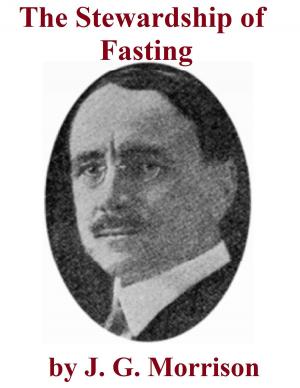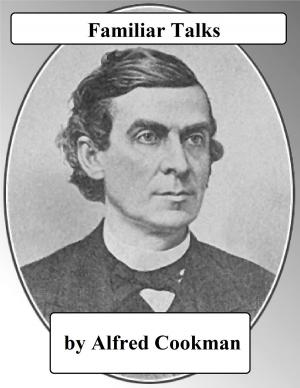True Evangelism
Winning Souls by Prayer
Nonfiction, Religion & Spirituality, Christianity, Evangelism, Christian Life| Author: | Lewis Sperry Chafer | ISBN: | 1230001763652 |
| Publisher: | Jawbone Digital | Publication: | July 14, 2017 |
| Imprint: | Language: | English |
| Author: | Lewis Sperry Chafer |
| ISBN: | 1230001763652 |
| Publisher: | Jawbone Digital |
| Publication: | July 14, 2017 |
| Imprint: | |
| Language: | English |
From the Introduction:
If the reputation of the author be not yet continentally established, a foreword to his book may be useful. “True Evangelism,” when first published, bore on its pages a reassuring and discriminating appreciation from one of the most trusted and successful evangelists of our time. Rev. Lewis Sperry Chafer since then has achieved outstanding distinction both as Bible teacher and author. What further good purpose can another foreword to this new and revised edition serve? To “born again” ones who read the book studiously and reverently (and no other can understand it, whatever their education, theological or otherwise, 1 Corinthians 2:14) little or none; but to those who may be in a similar mental condition toward books on evangelism as that in which the undersigned found himself when he first glanced through this book in a book store, it may be like the voice the great Augustine heard, “Take and read”—and if it induces them to read, then they will know the profit. At that time I had not the joy and enrichment of a personal acquaintance with the author, whose friendship, love and brotherly counsel have been one of God’s choicest gifts to me in the past four years. The title attracted me, for my estimation of the surpassing importance of the subject had led me to purchase almost every book on this theme that had come to my notice. However, so often I had been disappointed with the unsatisfactory and unscriptural character of many of these, that I had passed the buying-at-sight stage. Arrested by the thoughtful and evangelical tone of the foreword, I began to sample its pages and found that it promised to be a book with a distinctive, timely, and Scriptural message on this vital theme. A careful reading followed, which more than justified the forecast I had made. So many other books on this subject were disappointing, not because they were lacking in style, vivacity or popular phraseology, but because vitally lacking in spiritual interpretation,—especially concerning the two great master ideas of God’s Holy Word,—Sin,—Redemption. Jerome, in the fourth century, declared that “light views of sin induced false views of God,” and the late master-preacher, McLaren of Manchester, stated that “ninety per cent of all doctrinal errors have grown up around defective views of sin.” Any theory that minimizes sin minimizes the redemptive work of our Lord Jesus Christ and the regenerative work of the Holy Spirit. Such theory also must make a large appeal to men (almost betimes as frantic as that of the Prophets of Baal on Carmel’s summit), and clever little devices have been invented to induce men to “take Christ,” or “step over the line,” and which offer to settle the great eternal question by an oral acceptance of a simple synthesis, or of a little formula on a small printed card.
One turns from these naturalistic, legalistic, colorless conceptions of sin and salvation to this precious book with its grave, thorough, Biblical treatment of Man’s sin and God’s salvation, and finds his heart full of praise to God for empowering His humble and honored servant to send forth a message so virile, timely, and throbbing with power.
May the Triune God, Whose Word and grace it magnifies, speed this unpretentious book on its beneficent mission, that by His grace and power it may accomplish what He pleases, and hasten the coming and Kingdom of our Lord and Savior, Jesus Christ.
A.B. Winchester
From the Introduction:
If the reputation of the author be not yet continentally established, a foreword to his book may be useful. “True Evangelism,” when first published, bore on its pages a reassuring and discriminating appreciation from one of the most trusted and successful evangelists of our time. Rev. Lewis Sperry Chafer since then has achieved outstanding distinction both as Bible teacher and author. What further good purpose can another foreword to this new and revised edition serve? To “born again” ones who read the book studiously and reverently (and no other can understand it, whatever their education, theological or otherwise, 1 Corinthians 2:14) little or none; but to those who may be in a similar mental condition toward books on evangelism as that in which the undersigned found himself when he first glanced through this book in a book store, it may be like the voice the great Augustine heard, “Take and read”—and if it induces them to read, then they will know the profit. At that time I had not the joy and enrichment of a personal acquaintance with the author, whose friendship, love and brotherly counsel have been one of God’s choicest gifts to me in the past four years. The title attracted me, for my estimation of the surpassing importance of the subject had led me to purchase almost every book on this theme that had come to my notice. However, so often I had been disappointed with the unsatisfactory and unscriptural character of many of these, that I had passed the buying-at-sight stage. Arrested by the thoughtful and evangelical tone of the foreword, I began to sample its pages and found that it promised to be a book with a distinctive, timely, and Scriptural message on this vital theme. A careful reading followed, which more than justified the forecast I had made. So many other books on this subject were disappointing, not because they were lacking in style, vivacity or popular phraseology, but because vitally lacking in spiritual interpretation,—especially concerning the two great master ideas of God’s Holy Word,—Sin,—Redemption. Jerome, in the fourth century, declared that “light views of sin induced false views of God,” and the late master-preacher, McLaren of Manchester, stated that “ninety per cent of all doctrinal errors have grown up around defective views of sin.” Any theory that minimizes sin minimizes the redemptive work of our Lord Jesus Christ and the regenerative work of the Holy Spirit. Such theory also must make a large appeal to men (almost betimes as frantic as that of the Prophets of Baal on Carmel’s summit), and clever little devices have been invented to induce men to “take Christ,” or “step over the line,” and which offer to settle the great eternal question by an oral acceptance of a simple synthesis, or of a little formula on a small printed card.
One turns from these naturalistic, legalistic, colorless conceptions of sin and salvation to this precious book with its grave, thorough, Biblical treatment of Man’s sin and God’s salvation, and finds his heart full of praise to God for empowering His humble and honored servant to send forth a message so virile, timely, and throbbing with power.
May the Triune God, Whose Word and grace it magnifies, speed this unpretentious book on its beneficent mission, that by His grace and power it may accomplish what He pleases, and hasten the coming and Kingdom of our Lord and Savior, Jesus Christ.
A.B. Winchester















